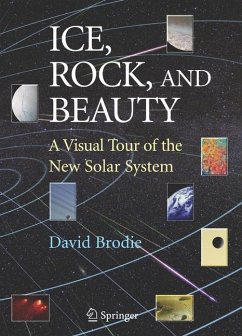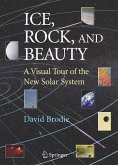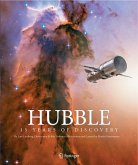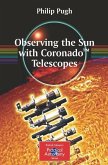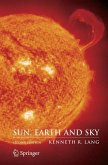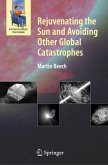Although most people have some knowledge of the essential structure of the Solar System, few are familiar with the large and varied array of objects that travel with and between the planets in their journeys around the Sun.
Imaging techniques from Earth continue to improve, while missions such as Voyager, Galileo and the Hubble Space Telescope have yielded many excellent images. Most significantly of all, several missions in recent years have shown a huge diversity of objects in close-up for the first time. The book will take advantage of the rich pool of images that is available, to tell a story of the Solar System that has not been told before.
Smaller Bodies will be a collection of approximately 72 stunning images, all from the public domain but not hitherto gathered into a coherent collection, with supporting text and graphics. Each main image will be accompanied by a graphic showing the location in the Solar System of the featured object. All of these graphics will be based in a simple template providing a simple representation of the Solar System. Text will not be extensive, allowing page design to have a high priority, and will be of three kinds. 'Main text' (approximately 200 words) will provide stimulating introduction and some key ideas. Text headed 'The object(s)' (25-75 words) will provide a brief description of featured objects. Text headed 'The image' (25-75 words) will provide information on the source of the image and some brief technical information where required (such as in describing use of false color).
The book is intended for anybody who lives in solar orbit and takes a general interest in the solar neighborhood.
Imaging techniques from Earth continue to improve, while missions such as Voyager, Galileo and the Hubble Space Telescope have yielded many excellent images. Most significantly of all, several missions in recent years have shown a huge diversity of objects in close-up for the first time. The book will take advantage of the rich pool of images that is available, to tell a story of the Solar System that has not been told before.
Smaller Bodies will be a collection of approximately 72 stunning images, all from the public domain but not hitherto gathered into a coherent collection, with supporting text and graphics. Each main image will be accompanied by a graphic showing the location in the Solar System of the featured object. All of these graphics will be based in a simple template providing a simple representation of the Solar System. Text will not be extensive, allowing page design to have a high priority, and will be of three kinds. 'Main text' (approximately 200 words) will provide stimulating introduction and some key ideas. Text headed 'The object(s)' (25-75 words) will provide a brief description of featured objects. Text headed 'The image' (25-75 words) will provide information on the source of the image and some brief technical information where required (such as in describing use of false color).
The book is intended for anybody who lives in solar orbit and takes a general interest in the solar neighborhood.
From the reviews:
"The author's plan is simple but compelling: select about 60 recent, stunning images of objects in the solar system and arrange them on double-page spreads so that each image is printed nice and large with related text on its facing page. ... It's a lovely book to dip into, with interesting angles on most of the objects chosen. A full index enables readers to navigate to entries of particular interest. ... Brodie shows how naturally science and humanity go together." (Peter Campbell, Physics Education, March, 2008)
"Brodie, a travel writer and textbook author, encapsulates, in dozens of color pictures with explanations alongside, the great gain in the sophistication available in the images from recent space probes. ... This book is for anyone who seeks to keep up on the solar system as it is known in the 21st century. Summing Up: Recommended. All readers/libraries." (A. R. Upgren, CHOICE, Vol. 45 (11), July, 2008)
"The aim of Ice, Rock, and Beauty ... is to show the diversity of the objects in the Solar System. ... The content is written in a beautifully poetic way ... . Each description is accompanied by a schematic of the Solar System , usefully illustrating the location of the Sun, Earth and the body that is being described. ... With accessible, descriptive language that captures the wonders of the Solar System, this book would be an excellent read ... ." (Emily Baldwin, Astronomy Now, October, 2008)
"This book is a collection of images of the smaller bodies in the Solar System. The greater part is taken up by more than sixty images, some in black and white, some in colour, true or false, and a few graphics. Nearly all the images are from space and are credited to NASA. ... The prose style is vivid and enthusiastic, well matching the images. ... The pictures are beautiful ... ." (Derek Jones, The Observatory, Vol. 128 (1206), October, 2008)
"The author's plan is simple but compelling: select about 60 recent, stunning images of objects in the solar system and arrange them on double-page spreads so that each image is printed nice and large with related text on its facing page. ... It's a lovely book to dip into, with interesting angles on most of the objects chosen. A full index enables readers to navigate to entries of particular interest. ... Brodie shows how naturally science and humanity go together." (Peter Campbell, Physics Education, March, 2008)
"Brodie, a travel writer and textbook author, encapsulates, in dozens of color pictures with explanations alongside, the great gain in the sophistication available in the images from recent space probes. ... This book is for anyone who seeks to keep up on the solar system as it is known in the 21st century. Summing Up: Recommended. All readers/libraries." (A. R. Upgren, CHOICE, Vol. 45 (11), July, 2008)
"The aim of Ice, Rock, and Beauty ... is to show the diversity of the objects in the Solar System. ... The content is written in a beautifully poetic way ... . Each description is accompanied by a schematic of the Solar System , usefully illustrating the location of the Sun, Earth and the body that is being described. ... With accessible, descriptive language that captures the wonders of the Solar System, this book would be an excellent read ... ." (Emily Baldwin, Astronomy Now, October, 2008)
"This book is a collection of images of the smaller bodies in the Solar System. The greater part is taken up by more than sixty images, some in black and white, some in colour, true or false, and a few graphics. Nearly all the images are from space and are credited to NASA. ... The prose style is vivid and enthusiastic, well matching the images. ... The pictures are beautiful ... ." (Derek Jones, The Observatory, Vol. 128 (1206), October, 2008)

